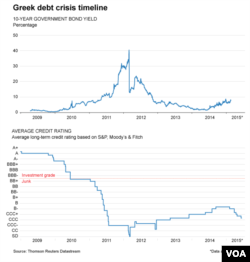U.S. Treasury Secretary Jack Lew urged Greek Prime Minister Alexis Tsipras to find ‘a sustainable’ solution to the Greek financial crisis for the sake of the global economy. Markets reacted negatively to the closure of Greek banks and the impasse between Athens and the European Union as Tuesday’s deadline for a Greek loan repayment looms.
Greek Bank Controls
Greek Bank Controls
- All banks closed until July 6
- ATM withdrawals limited to $66 a day
- Foreign bank cards not affected by limits
- Stock exhanges closed June 29
- Transfering money out of Greece prohibited
- Pension payments are exempt from restrictions
Lew told the Greek prime minister Sunday it is in the best interests of Greece, Europe and the global economy to find a sustainable solution that puts Greece on a path toward reform and recovery within the 19-member Eurozone.
He said it is important all parties continue to work to reach a solution involving both reform and potential debt relief, and called on Athens to maintain financial stability.
Lew also spoke separately Saturday with International Monetary Fund (IMF) chief Christine Lagarde and his French and German counterparts. President Barack Obama spoke with German Chancellor Angela Merkel Sunday about what the White House calls the critical importance of Greek reform and growth within the Eurozone.
Gary Hufbauer of the Washington-based Peterson Institute for International Economics said the U.S. is alarmed over the potential wider implications of the Greek financial crisis.
"The U.S. is concerned that the chaos in Greece could be infectious and will lead to doubts about Portugal and Spain and Italy and cause trouble, and will cause disunity in Europe’s resolve with respect to Russia over the Ukraine situation," said Hufbauer.
Silvercrest Asset Management chief strategist Patrick Chovanec said that given the breakdown in confidence between Russia and the West, even limited Russian financial help for Greece’s leftist Syriza government represents a geopolitical challenge.
He added that even though the U.S. is not directly exposed to the losses a Greek default represents, anything that undermines the Eurozone economy could have serious global implications.
"It creates uncertainty, especially since it is taking place in a very disorganized way," said Chovanec. "The immediate result in Greece will probably be an immense amount of pain and so markets don’t like uncertainty. They want to know where things are heading and nobody knows where this is heading."
After the Greek government’s talks with its international lenders broke down Saturday, the European Central Bank (ECB) on Sunday decided not to expand its emergency loan program forcing Athens to shut the country's banks until July 6, keep the stock market closed Monday, and limit individual cash withdrawals to 60 euros daily.
Bailout decision
Tsipras said he will let the Greek people decide whether to accept the latest bailout offer in a referendum July 5. The bailout offer would mean further austerity measures, possibly including pension cuts and higher taxes. The Greek leader is urging people to vote against the European offer.
Hufbauer said Greece owes the IMF nearly $1.8 billion by Tuesday, when the current international bailout expires and $8 billion will no longer be available to Athens.
"Anybody who is owed money by Greece, which is mainly banks and the official creditors, the European Central Bank, they can basically say that what is owed to them is unlikely to be paid on a timely manner," he said. "They’ve lost the value of their loans which is a couple hundred billion dollars is very much in doubt."
Hufbauer said the larger question is whether Athens will leave the Eurozone, which even Tsipras acknowledged will be at the heart of next Sunday’s referendum.
Eurozone
Chovanec said while Greece is a relatively small economy, the implications of its departure from the Eurozone could set an ominous precedent:
"The problems that exist in Greece and the contentious issues between Greece and the rest of Europe, particularly the creditor countries of Europe — they exist in other countries as well, in Spain, in Portugal, even in Italy," he said.
Chovanec added that the concern is that "whatever happens in Greece sets a precedent, whether that is debt forgiveness — and that creates a wave of demands for debt to be wiped out — or whether that takes the form of a default or even an exit from the euro."
Hufbauer, however, sees a possible Greek departure from the Eurozone that strengthens the resolve of the remaining members to stay. He cited three reasons why Greece is a unique case.
“One, its debt level, which is a couple hundred percent of its gross domestic product, two, its incompetence in managing the crisis and undertaking any reforms and, three, its election of a really defiant, rather pro-communist government,” he said.
He said that outside the Eurozone, Greece will revert to the traditional drachma currency and continue to shrink economically. Monday, global stock values, along with the euro and the price of oil, fell sharply.













